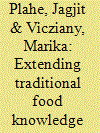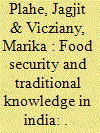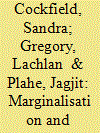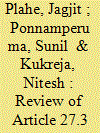|
|
|
Sort Order |
|
|
|
Items / Page
|
|
|
|
|
|
|
| Srl | Item |
| 1 |
ID:
154560


|
|
|
|
|
| Summary/Abstract |
Small farmers, who are normally dependent on marketing intermediaries, have formed themselves into co-operatives in the Indian states of Telangana, Andhra Pradesh and Maharashtra and have started to sell their produce directly to consumers via retail outlets, the Internet, urban franchises, mobile vans, rural food hubs and as branded products. The key engine for this marketing experiment is the Sahaja Aharam Producer Company Limited (SAPCO), a producer organisation. SAPCO has tried to create new supply chains that guarantee that the produce it sells complies with the quality standards needed to certify the foods as ‘organic’. SAPCO is an initiative of the Centre for Sustainable Agriculture (CSA) which has taken up the bulk of the financial and administrative burden of managing the company. The revival of traditional knowledge for organic farming and the marketing of organic produce has invariably required the intervention of external agents such as CSA. In the final section, we assess the achievements of SAPCO from the viewpoint of the small farmers who belong to the producer co-operatives that make up SAPCO's membership. Our key research question is whether it has been possible to scale up the production and marketing of small farmers’ output and create a new supply chain independent of local intermediaries.
|
|
|
|
|
|
|
|
|
|
|
|
|
|
|
|
| 2 |
ID:
154555


|
|
|
|
|
| Summary/Abstract |
In this first paper, we explain why traditional knowledge is an important theme in the study of Indian agriculture, especially given the crises routinely facing poor, smallholder farmers. We begin with an overview of some of the key authors who have written about the problems facing small farmers both within and outside India. Different authors have focused on different aspects of the benefits that can be derived from the local knowledge and skills of farmers, but these do not always pertain to organic farming. Our interest in organic farming is specifically about ‘traditional’ knowledge. With the industrialisation of agriculture in India and elsewhere, many poor, small farmers have been deskilled and placed into vulnerable positions. Traditional knowledge has been undermined, overwhelmed or has survived only in fragments. How ‘traditional knowledge’ might be retrieved, reinvented, reintroduced and modified so as to create a farmer-driven, sustainable and biodiverse agriculture is our concern. In the final section of this paper, we analyse the four situations we have been working on as examples of the possibilities and challenges facing the revival of ‘traditional knowledge’ in the villages of Kolkata, central India and Sikkim.
|
|
|
|
|
|
|
|
|
|
|
|
|
|
|
|
| 3 |
ID:
154557


|
|
|
|
|
| Summary/Abstract |
India is in the grip of an agrarian crisis. Economic, social, environmental and political forces have adversely affected the relationship between the small-scale primary producer and the production process. In the context of this crisis, traditional knowledge-inspired food systems have given rise to ‘islands of success’ that have allowed small and marginal farmers to reclaim their livelihoods across the country. In this paper, we analyse three different islands of success using an agro-ecological framework, arguing that such islands of success based on traditional knowledge are becoming an increasingly necessary approach to agriculture. However, political will, political engagement and effective policies that support traditional knowledge in agriculture are required for these islands of success to become waves of change.
|
|
|
|
|
|
|
|
|
|
|
|
|
|
|
|
| 4 |
ID:
178456


|
|
|
|
|
| Summary/Abstract |
Under Article 27.3(b) of the Trade-Related Aspects of Intellectual Property Rights (TRIPS) Agreement of the World Trade Organization (WTO), all members are required to extend private property rights to life forms. Using official WTO documents, this article analyzes the negotiating positions of WTO members on life patents during a review of Article 27.3(b) which commenced in 1999 and is currently ongoing. Initially, developing countries raised serious ethical concerns regarding life patents, creating a clear North-South divide. However, over time the position of Brazil and India moved away from the ethics of life patents to the prevention of bio-piracy, a position supported by China. Russia too is supportive of life patents. A group of small developing countries have, however, continued to question the morality of life patents despite this “BRIC wall,” changing the dynamics of the negotiations from a North-South divide to one which now includes a South-South divide.
|
|
|
|
|
|
|
|
|
|
|
|
|
|
|
|
|
|
|
|
|